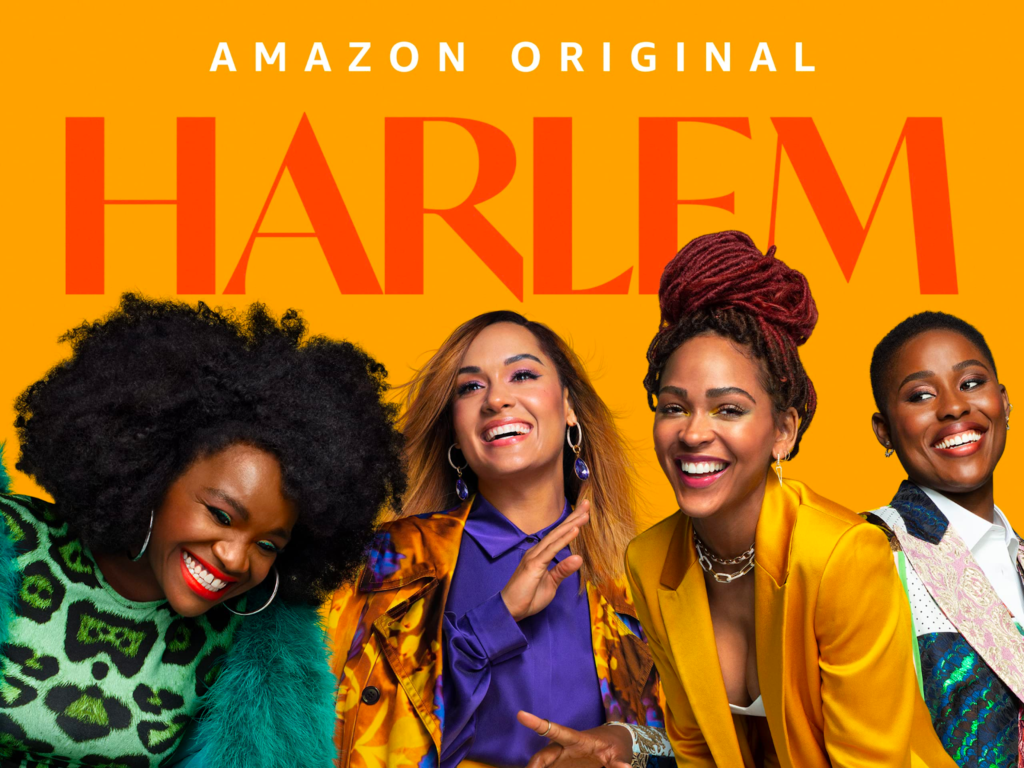
HARLEM TV Show Review
By Esther Alatishe
The long-yet-somehow-fast year of 2021 brought with it many works of film and TV that reflected some very real aspects of life: the mundane, the chaotic, the ridiculous, the ironic, the disappointing, the ambiguous, and the happy. One of those works was the first season of the Amazon Prime TV show Harlem. Don’t get me wrong– the show does not perfectly mirror the everyday lives of most of us. It’s a comedy that comedys, exaggerating many of its characters’ personalities and dilemmas. I won’t say too much, but, for example, one storyline in an episode involves a kidnapping and robbery that literally no one involved takes seriously (IYKYK). Yet, as comedies anyway tend to do, Harlem brings up deep, relatable issues regarding love lives, career plans, family relationships, and overall personal identity through the storylines of its four main characters– Camille (Meagan Good), Tye (Jerrie Johnson), Quinn (Grace Byers), and Angie (Shoniqua Shandai). These issues exist in ways that also bring up intersectional conversations on race, class, gender, sexuality, nationality– conversations we all encounter in some way.
Take for example one specific scene— which got some attention on TikTok— where Angie has to basically deal with white woman tears (the expectation of an undue apology) in a workplace setting that is supposedly progressive. The show makes sure you feel a lot of the anger and powerlessness of a racist situation like that— a situation where you have to be cordial and keep the peace when no one is really acknowledging that you were wronged and shouldn’t be the one trying to make the other(s) comfortable again. Even in these “progressive” places, the show does a good job (of course exaggerated still) pointing out a lot of ironies through which white liberals can still feel very comfortable with racism. For example, within Harlem, there is talk of a movie (of course called “The Pursuit of Forgiveness”) that is basically a parody of white savior movies like The Best of Enemies where audiences only walk away with very questionable ideas about racial unity and progress. Interesting conversations then come up as characters debate the good and bad of these movies/works of art: Don’t they still offer some form of success to the black creatives involved? Can we both criticize and celebrate? And do black creatives need to compromise on their messaging in order to really make it big in these industries?
These are just some aspects of a show that again brought up all kinds of intersectional conversations. Still, Harlem has some flaws— one even being the exaggerated personality of this same character, Angie. The colorist/featurist expectations of a woman like her, compared to the rest of the main cast, definitely jump out when she constantly jokes about being “ratchet” throughout the show. Also, as someone from the city, I see the show’s depiction/cinematography of Harlem as mostly limited to pretty shops and a lot of brownstones. I understand the importance of aesthetics (and the show has a nice one), but, you have to step it up with the representation if you’re going to call yourself Harlem.
Overall, though, this first season was fun to watch. The soundtrack was great and episodes often ended with interesting cliffhangers. Some characters were written pretty realistically and had me remembering instances in my life when I’ve met someone exactly like that. Circumstances in characters’ lives throughout the show were relatable in sad, funny, or comforting ways. Of its different lessons, I liked the ones about prioritizing your physical and mental health as well as letting go of unrealistic goals. Harlem is a show that gives you a lot to feel and talk about, and I would definitely recommend it.

